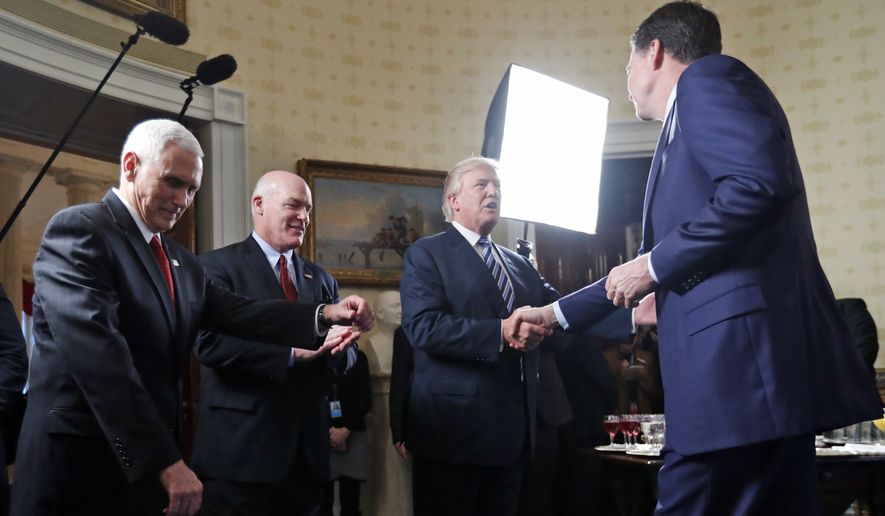Days after his inauguration, President Trump met FBI Director James B. Comey at a White House reception and made a point to shake hands, with the president joking Mr. Comey had “become more famous than me” thanks to his involvement in the 2016 election.
On Tuesday Mr. Trump fired Mr. Comey, with administration officials saying the handling of the election and subsequent probes had cost the longtime lawman the confidence of the president.
The firing was the denouement of a saga that played out over the last two years.
As the Republican nominee, Mr. Trump expressed bitter disappointment that Mr. Comey decided against prosecuting Democratic presidential nominee Hillary Clinton over her private email server. He said Mrs. Clinton was being “protected” by powerful forces.
“Well, you have to understand it’s a rigged system and she’s protected,” Mr. Trump said.
Days before the election, Mr. Trump blasted the FBI’s decision without mentioning Mr. Comey directly.
SEE ALSO: Donald Trump mocks Democrats’ reaction to James Comey firing, hints at replacement
He called for “the American people to deliver justice” that he said the FBI wasn’t able to.
Yet after he was sworn in, Mr. Trump seemed to bury the hatchet, asking Mr. Comey to remain, and exchanging that very public greeting with him.
Things grew particularly tense, however, as Mr. Comey’s probe developed into Trump campaign operatives’ dealings with Russia.
White House chief of staff Reince Priebus encountered FBI Deputy Director Andrew McCabe in a hallway of the West Wing on Feb. 15, when Mr. McCabe pulled Mr. Priebus aside to tell him that a New York Times article about contacts between Trump aides and Russians during the presidential campaign was “garbage.”
Mr. Priebus asked Mr. McCabe and Mr. Comey if the FBI would push back publicly against the news story, but the FBI declined, saying it couldn’t be involved in refereeing news articles.
White House press secretary Sean Spicer expressed frustration at the time over the FBI’s refusal to back up the White House and over Democrats portraying Mr. Priebus as trying to exert pressure on the FBI.
SEE ALSO: James Comey fired as FBI director
“The chief of staff said, well, you’ve put us in a very difficult situation,” Mr. Spicer said at the time. “You’ve told us that a story that made some fairly significant accusations was not true. And now you want us to just sit out there.”
Hours before the president fired Mr. Comey, reporters asked Mr. Spicer if the president still had confidence in the FBI director. Mr. Spicer qualified his answer.
“I have no reason to believe — I haven’t asked him,” he said. “I have not asked the president since the last time we spoke about this. I don’t want to start speaking on behalf of the president without speaking to him first.”
Republicans also have been wary of Mr. McCabe for failing to disclose campaign contributions to his wife, Jill McCabe, when she ran for statewide office in Virginia. Mr. McCabe didn’t list on a financial disclosure report his wife’s salary or $467,500 that her campaign received from Common Good VA, a political action committee controlled by Democratic Gov. Terry McAuliffe, a close ally of Hillary Clinton, in 2015.
The FBI said at the time that Mr. McCabe complied with disclosure rules.
In an April 28 interview with the The Washington Times, Mr. Trump was asked what he thought of the FBI offering last fall to pay former spy Christopher Steele to continue his opposition research investigation of Mr. Trump and his aides.
“I think if that’s true with the FBI, that would be very disgraceful,” the president said. “You understand that.”
Mr. Steele produced the “dossier” that made a series of unverified and salacious charges against Mr. Trump and his aides, centering on supposed collusion with Russian intelligence. Six targets in the dossier have denied Mr. Steele’s charges, some labeling them fabrications.
FBI historians have been closely watching Mr. Comey’s interaction with the White House.
Tim Weiner, the Pulitzer Prize-winning author of “Enemies: A History of the FBI,” said the bureau has worked to check and confront the power of the president since its first director, J. Edgar Hoover, ran the agency.
“The FBI has gone after presidents and administrations before,” Mr. Weiner told The Washington Times last week after Mr. Comey testified twice before Congress. “My view of him (Comey) is that he is a stand-up guy faced with a political and legal snakepit that very few outsiders could possibly comprehend.”
Mr. Weiner added that there were major questions as to how the American justice system would ultimately handle the Russia investigation, which he characterized as a national security threat not seen since the start of the Cold War.
“In a political landscape that is so littered with landmines, Comey can’t afford to take a false step,” he said.
⦁ Rowan Scarborough contributed to this article.
• Dave Boyer can be reached at dboyer@washingtontimes.com.
• Dan Boylan can be reached at dboylan@washingtontimes.com.




Please read our comment policy before commenting.